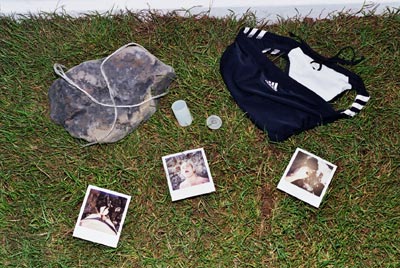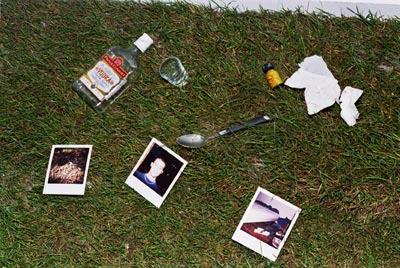On a series of queer becomings:
Selected Becomings-invertebrate 2003-2005
Paul Hurley
[1] Since August 2003, Paul Hurley has been making an ongoing series of becomings-invertebrate; public and private actions performed for live audiences as well as for camera and video, and presented at galleries, festivals and performance events internationally. What follows is a selection of texts and documentation of some of these performed actions.
"Beyond the edge of the so-called human, beyond it but by no means on a single opposing side, rather than "the Animal" or "Animal Life," there is already a heterogeneous multiplicity of the living, or more precisely (since to say "the living" is already to say too much or not enough) a multiplicity of organization or lack of organization among realms that are more and more difficult to dissociate by means of the figures of the organic and inorganic, of life and/or death." [i]
"When animals are carefully studied and compared, it is found that many of them have a row of bones (vertebras) along the middle of the back, as well as bones inside the limbs and head. […] These more or less familiar animals have a highly exaggerated importance in our minds because they are mostly of large size, because they are similar to us in structure and habits, and because, like us, they often manage to make themselves conspicuous. We are members of this group and share with others a common body plan; most of the organs and structures in the various kinds of vertebrates, including ourselves, are similar in form and function. Actually, the vertebrate body plan is only one of more than 30 in the animal kingdom. And in terms of the number of living species, vertebrates comprise only about 3% of the animal kingdom." [ii]
"An example: Do not imitate a dog, but make your organism enter into composition with something else in such a way that the particles emitted from the aggregate thus composed will be canine as a function of movement and rest, or of molecular proximity, into which they enter. Clearly this something else can be quite varied and be more or less directly related to the animal in question: it can be the animal's natural food (dirt and worm), or its exterior relations with other animals (you can become-dog with cats, or become-monkey with a horse) or an apparatus or prosthesis to which a person subjects the animal (muzzle and reindeer, etc.), or something that does not even have a localizable relation to the animal in question." [iii]
[2] To become-animal is to become a body-without-organs, to cut across the strata of organism, significance and subjectification that serve to (ab)normalise us as biological, social and sexual beings [iv]. In becoming-animal the body becomes an event, the action that it itself becomes; signification enters into deviation [v], identity into variance; the subject becomes a deject [vi], the abject other than object. To replace human identity with an interspecific performativity is to go some way towards destabilising the autonomous Cartesian subject and mobilising an ex-centric subject always in process. To become-animal is to be swept up by the visceral and to shed the backbone of knowledge and discourse so inherently bound to systems of power, processes of (hetero)normativity and mechanisms of alienation and exclusion (of bodies, behaviours and subjects). Becoming-invertebrate represents an espousal of multiplicity and nomadism, of "different moments, that is to say, different locations within space, that is to say different practices" [vii], it is an exploration of metamorphosis and hermaphroditism and a celebration of conjugation, fluidity and slipperiness.
Becoming-marine sponge (Sycon ciliatum)

[3] "Sycon is a marine sponge found attached to rocks or seaweed in shallow coastal waters around the British coast, growing upright on rock and in a pendulous manner on algae. […] Sponges are usually hermaphrodite and protandrous. During asexual reproduction sperm are released and carried in a water current to fertilise the ovum of another sponge in situ." [viii]
I tie my feet to a rock on Penarth beach and stand for half an hour until the tide reaches my knees. I then crouch in the water and attempt to masturbate. Modesty and the effect of cold water prevents me from doing this for long so I get out of the water and retreat underneath the cliff-face, where I masturbate and ejaculate into an empty 35mm film canister. Back in the water, I re-attach myself to a rock and release the semen into the sea.
Becoming-housefly (Musca Domestica)

[4] "Houseflies are found wherever dead organic matter is exposed. The flies feed on organic matter by first exuding saliva onto the food which dissolves it and then sucking up the resulting liquid." [ix]
On a sheet of clear plastic under which lies a video camera, I eat a lunch of tomato and couscous salad with a lemon dressing, and repeatedly regurgitate it until the food became a liquid consistency and I am able to ingest it simply by sucking the mixture through my lips.
Becoming-cockroach (Periplaneta Americana)

[5] "Cockroaches live in cracks and crevices, particularly near boilers and cookers, and emerge at night to feed on any organic matter. They can run very rapidly, but rarely fly, and are known to be particularly resistant to disease and contamination. […] The female carries, and later deposits, a purse shaped ootheca, containing two rows of eggs." [x]
Naked except for a US Army spec gasmask, I lay next to the cooker in my kitchen concealing my body under the shelves beneath the sink. Once my housemates have gone to bed I raid the fridge, feeding on some organic yoghurt and a granny smith apple. I then insert eight chocolate eggs inside my anus and deposit them into a plastic bag, some of them melting with my body heat and having to be extricated using a surgical glove.
Becoming-spider (Pholcus phalangioides)

[6] "Garden spiders are terrestrial animals which live in dry places and feed mainly on insects which are trapped in the web. Male and female spiders are indistinguishable when immature and both spin webs. When sexually mature, the male spins a small sperm web, deposits onto it a drop of semen and dips the pedipalps into it to charge them with sperm." [xi]
Using a reel of embroidery thread inserted in my anus, I spin a web approximately 30 cm in diameter and promptly masturbate over it, ejaculating onto the web. The whole process is captured by a tiny spy-camera attached to the underside of my crotch using lengths of elastic and a number of safety pins.
Becoming-earthworm (Lumbricus terrestis)

[7] "Earthworms are terrestrial animals which burrow in soil. They swallow soil, which is rich in organic matter and it is on this that they feed together with vegetable matter […] Although hermaphrodite, copulation occurs at night during which spermatozoa are exchanged between two individuals. The pairing worms separate soon after the exchange of seminal fluid has been completed." [xii] "With their heads pointing in different directions, the two worms appose the ventral surfaces of their anterior ends. Mucus is secreted until each worm becomes enclosed in a mucous sheath that extends from the openings of the sperm receptacles to the posterior edge of the clitellum, a ring of thickened glandular epithelum that, during mating, is opposite the sperm receptacles of the partner". [xiii]
I walk to Hamadrydad Park, at the end of our street in Butetown, and dig a hole roughly ten inches deep before eating several spoonfuls of the dirt that I have excavated. Later that evening, drunk on Foucault and a half bottle of cheap vodka, I go cruising in Club Exit where I meet a 22-year-old (possibly called Stuart). We go home, exchange seminal fluids (both swallowing) and he leaves in a taxi at 3.45am. We do not exchange telephone numbers and I do not see him again.
Becoming-snail (Helix aspersa)
Becoming-Snail. Click to play.
[8] "Quite apart from the lopsidedness that relates to helical coiling, gastropods are highly modified by a peculiar process called torsion, during which the visceral mass, mantle and shell become reoriented at 180° with respect to the head and foot. As a result of torsion, the nervous system becomes twisted into a figure of eight, and the products of the animal's digestive, excretory and reproductive systems are all discharged on top of its own head. The advantages of such an arrangement are not clear, but the process can be observed during gastropod development and appears to result from rapid asymmetrical muscular contraction." [xiv]
For two hours I trail a mucous trail with my tongue over the interior surface of a greenhouse, wearing only a jockstrap and a camouflage-print gymsack. Inside the gymsack is a large water bottle containing a mixture of my own urine, faeces, vomit and semen. The greenhouse is shared with a number of other lives snails collected from the wild in Cardiff Bay, themselves moving and existing independently of, but alongside, me on the glass.
Notes
[i] Derrida, J. (2002). 'The
Animal That Therefore I Am (More To Follow)'. Critical Inquiry,
Winter 2002, University of Chicago Press, p.399
[ii] Buchsbaum, R. et al. (1987). Animals Without Backbones, University of Chicago Press, p.7
[iii] Deleuze, G. &
Guattari (1988). F. A Thousand Plateaus: Capitalism and Schizophrenia,
University of Minnesota: Athlone Press, p.274
(iv) Deleuze & Guattari (1988). Ibid., p.159
[v] Deleuze & Guattari (1988). Ibid., p.159
[vi] Kristeva, J.(1980). Powers of Horror: An Essay on Abjection, New York: Columbia University Press, .p.8
[vii] Braidotti, R. (1994). Nomadic Subjects, New York: Columbia University Press, p.171
[viii] Robinson & Wiggins (1970). Invertebrates, London: Hutchinson, p.10
[ix] Robinson & Wiggins (1970). Ibid., p.57
[x] Robinson & Wiggins (1970). Ibid., p.44
[xi] Robinson & Wiggins (1970). Ibid., p.74
([xii] Robinson & Wiggins (1970). Ibid., p.26
[xiii] Buchsbaum, R. et al. (1987). Ibid., p.303
[xiv] Buchsbaum, R. et al. (1987). Ibid., p.255
